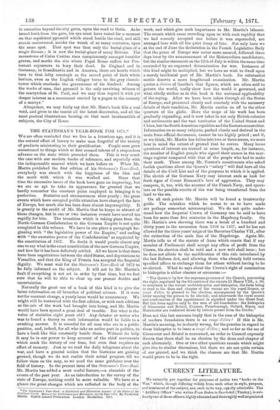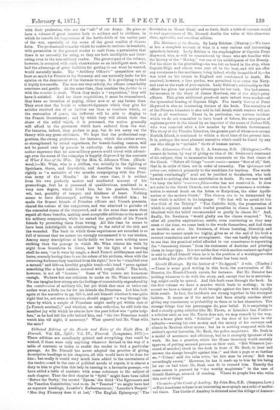CURRENT LITERATURE.
We naturally put together for purposes of notice two "books on the War," which, though differing widely from each other in style, purpose, and treatment of the subject, are, each in its way, equilly admirable. The " Artillery Officer" who writes From Sedan to Saartyriick (Tinsley), is evi- dently one of those officers, highly ednoated and thoroughly wellacguainted
with their profession, who are the "salt" of our Army. He gives us here a volume of groat interest both to soldiers and to civilians, in which he records his impressions of the battle-fields of the earlier part of the war, especially of the scene of the great conflict of Grave- lotte. The professional remarks which he makes he encloses in brackets, with permission to the general reader to omit them, a permission that there is no necessity for using, as they are both intelligible and inter- esting even to the non-military reader. The greater part of the volume, however, is occupied with such observations as an intelligent man, who had the advantage of great facilities for getting to see what he wanted, would naturally make. The "Artillery Officer's" sympathies are at least as much for France as for Germany, and one naturally looks for his opinion on the demeanour of the German troops. It is gratifying to find it highly favourable. The men are very orderly, the officers remarkably
courteous and gentle. At the same time, they combine the fortiter in re with the suaviter in modo. When they make a "requisition," they will
have it satisfied. And for these requisitions, it must be remembered, they have no intention of paying, either now or at any future time. They avow that the bonds or acknowledgments which they give for articles received are of no farther use than as vouchers which, on the restoration of peace, the sufferers will be able to display to the French Government ; and by which they will obtain their duo share of the relief which, it is presumed, the nation generally will afford to the provinces which have suffered from the war. For luxuries, indeed, they profess to pay, but do not carry out the theory with any great strictness. We hope that the professional sug- gestions, the strong preference, for instance, which the author avows, as strengthened by actual experience, for breech-loading cannon, will not be passed over by persons in authority. An opinion which our author expresses that no non-military person could travel with advant- age over the scene of the campaign is happily disproved by the contents
of What I Saw of the War. By the Hon. C. Allauson Winn. (Black-
wood.)—Mr. Winn, who is a civilian, was actually in the fighting at Speichern, Gorze, and Gravelotte, and describes his volume very rightly as "a narrative of two months campaigning with the Prus- sian army of the Moselle." At the same time, it is evident from his own perfectly modest and unaffected account of his Proceedings, that he is possessed of qualifications, combined in a
very rare degree, which fitted him for his position, bonhomie, wit, tact, geniality of temper, and kindness of heart. Nothing
seems to have discouraged, nothing to have offended him ; he made the firmest friends of Prussian officers and French peasants, shared the rations of the conquerors, and was admitted to partake of the concealed stores of the conquered, and at the same time more than repaid all these benefits, making most acceptable additions to the mess of his military companions, while he earned the gratitude of his French friends by protecting them from wrong. All this time he seems to have been indefatigable in administering to the relief of the sick and 'the wounded. The book in which these experiences are recorded is so lull of interest that we cannot too strongly recommend it to our readers. Among many descriptions of battle-fields we have seen nothing more striking than the passage in which Mr. Winn relates his walk by night from Gravelotte to Gorze, how by the light of a bursting shell he sees, "as it were by magic, a dead French artilleryman and his horse, scarcely having time to see the colour of his uniform, when with the returning darkness they vanished from his sight;" how he "stumbled over a mound," and felt—a horribly graphic touch—his hand "press against something like a hard cushion covered with rough cloth." The book, however, is not all "horrors." Some of 'the scenes are humorous enough. We have but one criticism to make on Mr. Winn's narrative. We can imagine how strong are the feelings of comradeship engendered by
the contuberniwn of military life, but yet think that once or twice our author went a little too far for his friends the Prussians. Let him look
again at the narrative in pp. 320-1, and ask himself whether it was quite right that he, not even a volunteer, should suggest "a way through the vines by which a couple of Prussians might easily get within shot of ra French sentinel] ;" and whether, on calm reflection, he still feels the manifest joy with which he relates how the poor fellow was "quite help- less," as he had left his rifle behind him, and "the two Prussians would watch him till night, if necessary." What quarrel had Mr. Winn with the man ?































 Previous page
Previous page